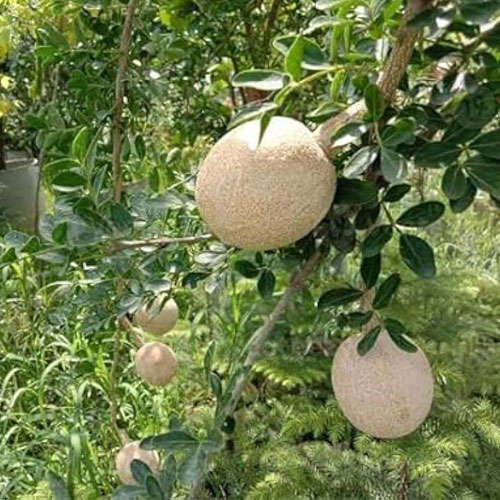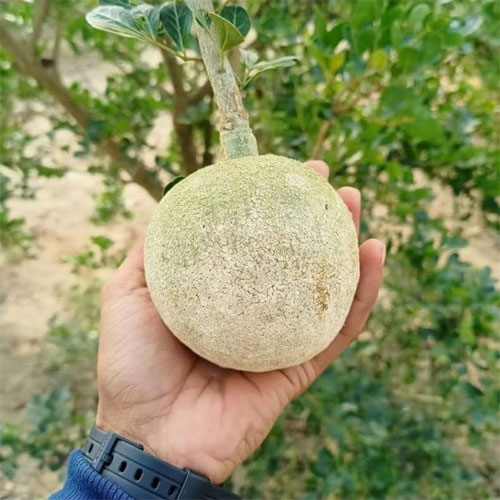Total Number of seeds: 30
🌳 Wood Apple Bael Fruit Seeds are perfect for those looking to grow a sacred, medicinal, and highly beneficial fruit tree right in their garden or farm. Known as Bael in Hindi, this tree holds deep cultural and health significance in India. It is revered in Ayurveda for its healing properties and worshipped in many households. The tree produces round, hard-shelled fruits with aromatic pulp used in juices, chutneys, and medicinal preparations.
These open-pollinated seeds are perfect for home gardens, farms, temple surroundings, and even large terrace pots. The tree thrives in tropical and subtropical climates with very low maintenance.
Type of Seed: Open-Pollinated, Non-GMO
Germination Time: 20–30 days
Hours of Sunlight Needed: Full sun (6–8 hours daily)
Where to Grow: Open field, backyard, or large terrace containers
Growing Season: Best sown from February to July
Seed Sowing Depth: 1–1.5 cm
Ideal Climate: Hot and dry to tropical climate
Plant Height: Grows up to 30–40 ft (can be maintained at 10–15 ft with pruning)
Organic Fertilizer Requirement: Compost or cow dung every 45 days
Life Span: Perennial tree, lives for decades
Ideal Growing Temperature: 25–35°C
Harvesting Time: 4–5 years after sowing
Maintenance Required: Very low
Watering Frequency: Weekly after germination
Ideal Grow Bag Size: Minimum 24-inch or plant directly in soil


The best time to sow Bael seeds in India is from February to July, covering the late winter to early monsoon. This allows sufficient warmth and moisture for proper germination and strong root establishment.
Use a large pot (minimum 24 inches deep) with drainage holes
Mix garden soil with sand and compost
Sow seeds 1–1.5 cm deep and water lightly
Keep in a sunny location and water once a week
Transplant to the ground once the sapling is about 12–18 inches tall
Preparation: Soak seeds in lukewarm water for 12–24 hours
Sowing: Direct sow in soil or seedling trays
Watering: Keep soil slightly moist during germination
Germination: Takes 20–30 days
Transplanting: When seedlings are 6–8 inches tall
Sunlight: Needs full sunlight for 6–8 hours
Soil: Well-drained, sandy-loam soil with organic matter
Fertilization: Use vermicompost or cow dung every 45 days
Pruning: Optional, to shape tree and control height
Support and Spacing: 6–8 ft spacing if planting more than one
Pest Control: Rarely affected by pests; neem oil spray if needed
Disease Prevention: Water sparingly; tree is highly drought-resistant
Mulching: Use dry leaves or cocopeat around base
1. Apply Nutrient-Rich Fertilizers
When your plants begin flowering, use nutrient-rich fertilizers like Organic Bone Meal Powder or Vermicompost. This helps in boosting the bloom and enhances overall yield.
2. Use Organic Fertilizers
Feed your plants with organic fertilizers such as Cow Dung Manure or Neem Cake. Organic options promote healthy soil life.
3. Regular Feeding
Apply fertilizers every 20-25 days to ensure plants receive a steady supply of nutrients. Choose from various options like Cocopeat Compost for moisture retention.
🌿 Highly Medicinal – Bael leaves and fruit are used in traditional Ayurvedic remedies
🙏 Sacred Tree – Considered holy and worshipped, especially in Shiva temples
🍈 Nutrient-Rich Fruit – Rich in fiber, vitamins, and antioxidants
💧 Drought-Tolerant – Survives even in dry, arid conditions
🪴 Low Maintenance – Minimal care once established
🧴 Versatile Usage – Used for juices, sherbets, and herbal mixes
Digestive Health – Bael pulp is known to cure stomach ailments
Religious Importance – Leaves are used in pooja rituals
Fruit Usage – Made into sherbets, chutneys, and health drinks
Medicinal Leaves & Bark – Used in Ayurveda for treating diabetes and infections
Shade Tree – Grows large and provides cooling shade
Do not overwater; tree is drought-tolerant
Requires full sun — avoid shaded areas
May take 4–5 years to bear fruits from seed
Protect young saplings from grazing animals or pests
Slow Germination: Soak seeds in warm water before sowing
Yellowing Leaves: Often due to overwatering or poor drainage
No Fruiting: Tree may take 4–5 years—this is normal
Pests: Rare, but neem oil can prevent aphids or mealybugs
Fungal Rot: Avoid water stagnation
Q: How long does it take for bael tree to bear fruits?
A: From seeds, it takes 4–5 years to start fruiting.
Q: Can I grow bael in pots?
A: Yes, use a large 24-inch pot for initial growth and transplant later for better results.
Q: Is bael tree suitable for hot climates?
A: Absolutely, it thrives in hot and dry regions.
Q: Can I grow bael for religious purposes at home?
A: Yes, it is considered auspicious to grow Bael trees in temples and homes.
Sign in now to receive a 5% instant discount on your first order when using code WELCOME. Begin your organic journey today!
By logging in, you're agreeing to our Terms of Service and Privacy Policy.
Sanjay
Sunlight aur halka moist soil mein grow fast hua.
Divya
Golden Hills se pehli baar liya, aur seed quality impressed karti hai.
Neetu
Ghar ke bagiche mein lagaya, achha develop ho raha hai.
Aarav
Natural fertilizer ke sath grow kiya, koi chemical nahi diya.
Kamla
Courier fast tha, aur label par sowing instructions bhi mile.
Sunita
Germination 1 week ke andar hi shuru ho gaya tha.
Meena
Bilkul desi bael tree jaisa grow kar raha hai, kaafi khush hoon.
Savita
Soaked seeds overnight, agle hafte sprouts nikal aaye.
Gopal
Packaging secure thi aur seeds bilkul fresh the.
Ramesh
Slow growing plant hai but worth the wait — sacred aur useful dono.